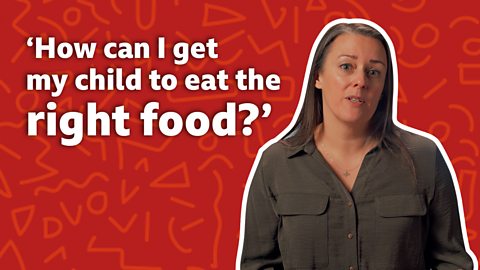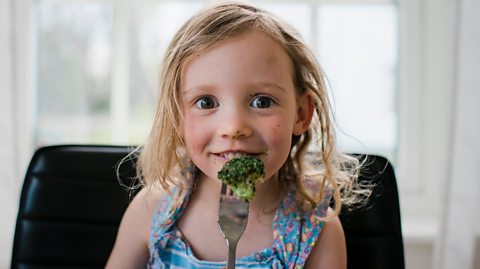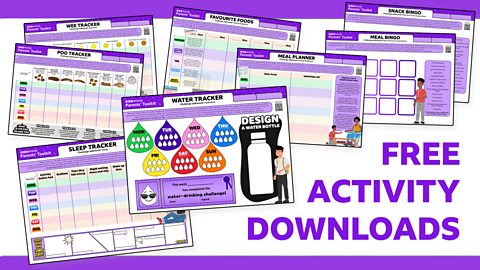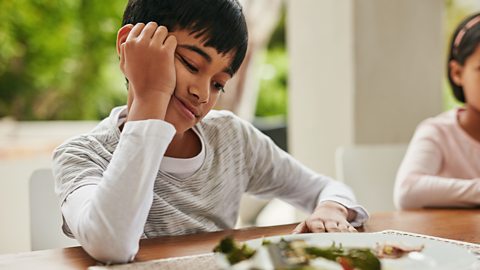Research shows food can have an impact on our child’s mood, their sleep and concentration, as well as their weight and overall health. As a parent, there are some simple ways you can encourage healthy eating habits in your children, to make eating together more fun, and help everyone to feel good, without needing to spend lots of money.
BBC Bitesize Parents’ Toolkit has put together a series of articles and activities you can try with your kids at home. You can find links to these below.
We’ve tried these resources out with a group of families and their responses and feedback are included in these articles. One of the participants, mum Priya, says: “Having the tools and different activities, helped us to [find] fun ways to introduce healthy eating, and also build healthy habits, and lead happy lives!”
How to use the Happy Family Eating resources with your family
Having a good educational tool for us is, you know, really helpful. It's important to us as well, because especially having a young family, you know, young children, it really helps them, it really benefits them and also us parents in the long run as well. We've learnt a lot from it so far. Yeah. Yeah? Yeah. And we've really enjoyed, especially the cooking parts together. The pack itself is a great tool. It doesn't just talk about the food itself, but it talks about the effort that goes into it, the ingredients, the amount of sugar and salt that's the recommended value for kids and adults. So I think having a good understanding about food and, you know, what goes in, is really what makes us. Food is a massive part of our lives. So it is good, you know, for me and also for the children to be able to see what they're eating, you know, what goes into the food. And also just kind of knowing what they like, what they don't like, what's good for their body, what's not good for their body, what, you know, makes them feel happy. What makes them feel maybe, you know, tired or sluggish. Yeah, perhaps I was a little sceptical, because it was almost as if they're telling me things that I should already know, or I do already know. So you think, well, what, would I actually get out of it? But once you read through it and you try a couple of your activities and you notice a sort of a tangible change in your eating habits and you think, oh, actually, you know, this is, there's something to this. It's quite useful. So it's almost as if the pack is, it's like a coaching tool for us parents really. Having this kind of information, I think that in a very well selected things, information about food, I mean, I think it's very useful for everybody. I would certainly recommend it for every family with children. Having the tools and the different activities it gives, helps us to, you know, do fun ways to introduce healthy eating and also build healthy habits and lead happy lives. Because if you can get the routines set in early, it would change their life when they're older.
Parent pack: Free downloadable activities
You can download the full Happy Family Eating Parents Pack for free; it includes a meal planner template, meal and snack bingo games, a sleep tracker as well as wee, poo and water trackers to try with your kids. See if you notice any changes after trying them out with your family.
Autism and food
If you want to know more about autism and food, we cover the most-asked questions by parents, such as:
- What’s the link between autism and food refusal?
- What is ARFID?
- What is pica?
- How can I help my autistic child enjoy food and family mealtimes?
- Tips for helping your child to feel more relaxed about mealtimes
- How can I cook and eat together with my autistic child?
You can also watch a short video on support for SEND children, and hear from parents' experiences at home with their child, and how they used resources from Parents' Toolkit.
'Fussy eating' and how to avoid mealtime battles
If you want to know more about 'fussy eating' and how to avoid mealtime battles, we cover the most-asked questions by parents, such as:
- Why does my child refuse to eat?
- How do I encourage my child to eat, introduce new foods and make it fun?
- Why do buffet-style meals help my child try new foods?
- What if my child won't eat anything? Won't this lead to food waste?
- Tips for introducing new foods to a ‘fussy eater’
You can also watch a short video on removing pressure from yourself as a parent, and hear from other parents on their experiences at home with their child. Use our free meal planner activity with your family.
Benefits of cooking together
If you want to know more about the benefits of cooking together with your child, we cover the most-asked questions by parents, such as:
- What are the benefits of cooking with children?
- How can I get my child engaged in cooking?
- What if my child has an allergy?
You can also watch a short video, hearing from parents' experiences of mealtimes at home with their child, as well as a free downloadable game: meal bingo!
Benefits of eating together
If you want to know more about the benefits of eating together as a family, we cover the most-asked questions by parents, such as:
- What positives have other families experienced after eating meals as a family more often?
- How does good food create a good mood?
- How can I create positive eating habits for my child?
You can also watch a short video, hearing from parents' experiences of mealtimes at home with their child.
How to read and understand food labels
If you want to know more about understanding food labels, we cover the most-asked questions by parents, such as:
- What does the 'traffic light system' for food labels mean?
- What is a healthy amount of fat?
- What is a healthy amount of sugar?
We also share five practical tips for reading food labels.
How do processed foods affect children?
If you want to know more about processed foods, we cover the most-asked questions by parents, such as:
- What are processed foods?
- Are all processed foods bad?
- How can we easily cut down on processed foods?
- What are some swaps I can make from processed to less processed food?
There's also an activity idea to do with your child as well as a simple homemade chicken nugget recipe.
Snacks for kids: How many, when, and what portion size is right?
If you want to know more about snacks, we cover the most-asked questions by parents, such as:
- What do I say if my child asks for food in between meal times?
- What if we can’t keep to the set snack times?
- What portion size should the snacks I give my child be?
- What if my child doesn't want the snack I’ve offered?
- How many calories should my child have?
There's also a free downloadable game: snack bingo!
Snacks for kids: How to make them (quickly and easily!)
If you want to know more about making snacks fun and easy, we cover the most-asked questions by parents, such as:
- I don’t have time to prepare snacks, what can I do?
- How can I make snacking fun and easy with kids?
- What snacks can I give my child if they have an allergy?
We share tips to make snacking with kids easier as well as ten snack ideas you can make under ten minutes!
How does food affect children’s sleep?
If you want to know more about how food affects children's sleep, we cover the most-asked questions by parents, such as:
- How does food affect children’s sleep and behaviour patterns?
- How much sleep do children need?
- Why is sleep important for children?
- How do I know if my child is hungry or is delaying sleeping?
We also share tips to help your child get a good night’s sleep, as well as a free downloadable sleep tracker to help you notice any patterns in your child's diet, their mood and their sleep!
What is a healthy amount of sugar for my child?
If you want to know more about sugar and how to cut down on your child's sugar intake, we cover the most-asked questions by parents, such as:
- What are the different sugars?
- Should I stop my child from eating sugar?
- What high sugar foods should I try to avoid?
- Are sugary drinks bad for my child?
- How do we work out the sugar content in foods and drinks?
- What are some simple sugar swaps?
We also share an activity you can do with your child to show them what sugar can do to our teeth.
How do I know if my child is dehydrated?
If you want to know more about the importance of staying hydrated, we cover the most-asked questions by parents, such as:
- Why is it important for my child to stay hydrated?
- How much should my child drink?
- How can I tell if my child is dehydrated?
- How can I get my child to drink more?
- What if my child doesn't want to drink water?
- Can I give my child something else to drink?
- My child won’t drink at school, what can I do to help?
- How can I encourage my child to go for a poo?
We have a free downloadable water tracker where you can create a weekly water-drinking challenge for your child, complete with a certificate! As well as a wee tracker and poo tracker to use over the course of a week to see if your child might be dehydrated.

Developing healthy eating habits is a process so don’t be disheartened if you feel like things aren’t changing right away. It’s a journey, and the main things that children will take with them into adulthood is how they feel when eating, so try to keep stress low and enjoyment high!
Advice and expertise across our Happy Family Eating content was provided by children’s dietitian Angharad Banner - an independent and NHS dietitian.

Parents' Toolkit
Fun activities, real-life stories, wellbeing support and loads of helpful advice - we're here for you and your child.

How do I get my kids to eat the right foods? - The Super Tutors
Catherine Jeans, 'The Food Know-It-All', explains how you can help your child find a healthy balance in their diet.

Five tips for helping your kids to eat healthily all year round
Healthy eating hacks for parents from dietitian Priya Tew.

What's the best food for my child's brain, mind and mood? - The Super Tutors
Catherine Jeans, a.k.a. 'The Food Know-It-All', explains how food affects a child's sleep, learning and mood.



